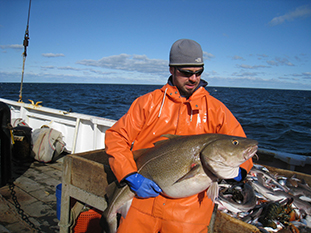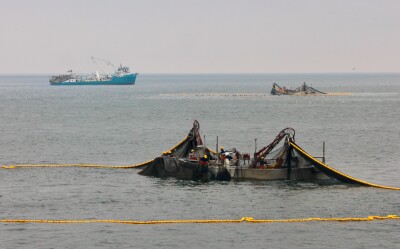Legend has it that when the Pilgrims arrived here in 1620, the cod were so thick off Massachusetts they had to swim with their backs out of water. The point being, of course, that greedy white men showed up and wrecked it for everybody.
Common sense is somewhat at odds with this notion, given that the Atlantic Ocean had been around for 130 million years by the time Mayflower arrived on Massachusetts Bay –enough time, one would otherwise think, to render the ocean so full of fish as to be unnavigable.
Fisherman with an Atlantic cod. NOAA file photo.Evidence implicit in the modern recovery of cod stocks, to say nothing of the fullness of time, confirms that cod, like other fish, cycle up and down depending on environmental conditions. Indeed, if the Pilgrims had arrived 100 or 200 years earlier it is entirely possible, if not likely, that they would not have found a single cod within 100 miles of Plymouth, Mass.
Recently I referenced the tremendous recovery of cod and haddock in the Barents Sea, off Russia and Norway. We now hear that the recovery of Newfoundland’s iconic northern cod, whose stocks “crashed” in 1994 (never to recover, the doomsayers told us), is under way and explosive.
Research published Oct. 27 in the Canadian Journal of Fisheries and Aquatic Sciences by Dr. George Rose of the Center for Fisheries Ecosystems Research at Memorial University of Newfoundland documents the stock’s rebound over the last 10 years from “a biomass of a few percent of its former size to several hundred thousand tons and growing” and calls it “arguably the most important comeback of any fish stock worldwide.”
I would not argue the point.
Rose documented the recovery in size, abundance, and fish condition first in one region and then in two more and noted a wide size range of fish, as well as strong recruitment from all three regions. “We are now at the third and final step,” of rebuilding, he wrote: “the production of widespread and strong recruitment.”
Rose cited a couple of key factors in the recovery. One is the increase in stocks of capelin, a forage fish of the smelt family about which we’ve heard little for decades (so left for dead were they). The increase has paralleled warming seawater temperatures. He also emphasized the importance of reduced fishing effort.
“The important take-away from this study is that with favorable environmental conditions, in this case the increase in capelin as a key food for this stock, and a severe reduction of fishing, even the most decimated fish stocks have the potential to recover.” As Rose has noted, there is no doubt that human behavior is an environmental condition that can be modified to benefit stocks. But just as his work makes clear that fishing practices modify the trajectory of marine biomasses, it also points out that at either extreme, the abundance of a fish stock is beyond our jurisdiction.







